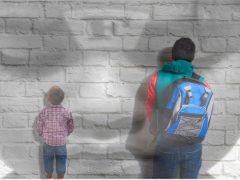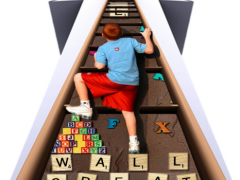NO MORE INSTRUCTIONAL CONFUSION, GUESSING, OR MIND-SHAME! Learning to Read is 1-2-3 (and free!): 1) Click on any word. 2) Try to read word in Pop-up. Can’t? Click word in Pop-up. 3) Repeat Step 2 as needed. Click on any word below and follow the steps: 1,2,3. to ice eye have know meow wolf pour fury idea heart acres […]
Archive | Technology for Learning

Early Learning Trajectories: The Obstacle Course Wall
Note: See Demo at bottom of page Convergence Point 1 – Decades of social and economic research, beginning with the Coleman Report and since including Heckman, (Nobel Prize winner) Rolnick (Ex. V.P. of the FED), Hanushek (Hoover Institute) and many others, and decades of developmental neuroscience research, most notably as compiled by Harvard’s Jack Shonkoff, have converged and coalesced into […]
Share this:
- Share on Facebook (Opens in new window) Facebook
- Share on X (Opens in new window) X
- Share on LinkedIn (Opens in new window) LinkedIn
- Share on Pinterest (Opens in new window) Pinterest
- Share on Reddit (Opens in new window) Reddit
- Share on Telegram (Opens in new window) Telegram
- Share on Tumblr (Opens in new window) Tumblr
- Share on WhatsApp (Opens in new window) WhatsApp
- Email a link to a friend (Opens in new window) Email
- Print (Opens in new window) Print
THE END OF ABSTRACT READING INSTRUCTION
Kids in the future will not be ‘taught’ to read. Every interaction with every word on every device will support them learning to read on their own. We only sense now. We only feel now. We only think now. We only learn now. We are naturally ‘wired’ to learn from what is happening on the living edge of now. Humans learn best […]
Share this:
- Share on Facebook (Opens in new window) Facebook
- Share on X (Opens in new window) X
- Share on LinkedIn (Opens in new window) LinkedIn
- Share on Pinterest (Opens in new window) Pinterest
- Share on Reddit (Opens in new window) Reddit
- Share on Telegram (Opens in new window) Telegram
- Share on Tumblr (Opens in new window) Tumblr
- Share on WhatsApp (Opens in new window) WhatsApp
- Email a link to a friend (Opens in new window) Email
- Print (Opens in new window) Print

“The Magic Ladder”
The Magic Ladder is a system of tools (free to schools and families) that has the potential to fundamentally improve the learning trajectories of more than half of the children in the U.S.
Share this:
- Share on Facebook (Opens in new window) Facebook
- Share on X (Opens in new window) X
- Share on LinkedIn (Opens in new window) LinkedIn
- Share on Pinterest (Opens in new window) Pinterest
- Share on Reddit (Opens in new window) Reddit
- Share on Telegram (Opens in new window) Telegram
- Share on Tumblr (Opens in new window) Tumblr
- Share on WhatsApp (Opens in new window) WhatsApp
- Email a link to a friend (Opens in new window) Email
- Print (Opens in new window) Print
Re: Man vs. Computer: Who Wins the Essay-Scoring Challenge?
Re: Man vs. Computer: Who Wins the Essay-Scoring Challenge? From Education Week: Curriculum Matters 4-13-2012 “The results demonstrated that overall, automated essay scoring was capable of producing scores similar to human scores for extended-response writing items with equal performance for both source-based and traditional writing genre,” says the study. This is fascinating. Artificial intelligence has already […]
Share this:
- Share on Facebook (Opens in new window) Facebook
- Share on X (Opens in new window) X
- Share on LinkedIn (Opens in new window) LinkedIn
- Share on Pinterest (Opens in new window) Pinterest
- Share on Reddit (Opens in new window) Reddit
- Share on Telegram (Opens in new window) Telegram
- Share on Tumblr (Opens in new window) Tumblr
- Share on WhatsApp (Opens in new window) WhatsApp
- Email a link to a friend (Opens in new window) Email
- Print (Opens in new window) Print
Re: We Can’t Teach Students to Love Reading
Re: the Chronicle of Higher Education’s Article: “We Can’t Teach Students to Love Reading” by Alan Jacobs, professor of English at Wheaton College. An important missing distinction: Most of the people who ‘love’ reading began loving it when they were children. In the past few decades there has been an unprecedented decline in how lovable reading is for most children […]
Share this:
- Share on Facebook (Opens in new window) Facebook
- Share on X (Opens in new window) X
- Share on LinkedIn (Opens in new window) LinkedIn
- Share on Pinterest (Opens in new window) Pinterest
- Share on Reddit (Opens in new window) Reddit
- Share on Telegram (Opens in new window) Telegram
- Share on Tumblr (Opens in new window) Tumblr
- Share on WhatsApp (Opens in new window) WhatsApp
- Email a link to a friend (Opens in new window) Email
- Print (Opens in new window) Print
Re: Who really benefits from putting high-tech gadgets in classrooms?
Re: the LA Times piece on the dubious promise of education technology… In 1991, In an article for the California School Boards Journal discussing the future of Learning and Educational Technology I wrote: “Systems capable of totally transforming our relationship with information, of providing a new (learner) interface to recorded knowledge, will ultimately prove to be […]
Share this:
- Share on Facebook (Opens in new window) Facebook
- Share on X (Opens in new window) X
- Share on LinkedIn (Opens in new window) LinkedIn
- Share on Pinterest (Opens in new window) Pinterest
- Share on Reddit (Opens in new window) Reddit
- Share on Telegram (Opens in new window) Telegram
- Share on Tumblr (Opens in new window) Tumblr
- Share on WhatsApp (Opens in new window) WhatsApp
- Email a link to a friend (Opens in new window) Email
- Print (Opens in new window) Print
